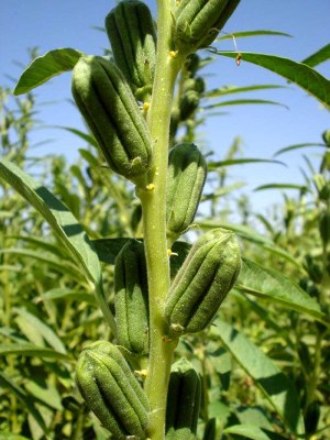U.S. mulls over importing sesame and guar from Sudan: official
July 31, 2015 (KHARTOUM) – Sudan’s minister of agriculture, Ibrahim al-Dikhairi, disclosed that the United States is considering granting exemption for the import of sesame and guar gum from Sudan which has been subject to economic sanctions for two decades.

Guar gum is a fine powder obtained by grinding guar seeds, which has numerous commercial applications, especially in the food, oil, explosives, tobacco, ink, plastic, textile and plastic industries.
Following his meeting with Lanier, al-dikhairi said that consultations are underway to import farming equipments and technologies from the U.S. in order to help develop the agricultural sector.
The agricultural minister said in a talk show broadcasted by the public Radio Omdurman on Friday that sesame is considered a strategic crop for Sudan, underscoring they are seeking to increase its production.
He pointed to the possibility of cooperation between Sudan and the American agricultural research centres particularly with regard to wheat and sesame in order to promote domestic production.
China, India, South Korea, Egypt, Saudi Arabia, Turkey and Lebanon are among the biggest importers of the Sudanese sesame.
Washington imposed economic and trade sanctions on Sudan in 1997 in response to its alleged connection to terror networks and human rights abuses. In 2007 it strengthened the embargo, citing abuses in Darfur which it labelled as “genocide”.
Khartoum has lobbied Washington intensively to lift sanctions, citing counterterrorism cooperation and facilitating South Sudan referendum but little progress has been made on this front.
However in 2010, the American administration announced it was easing sanctions on agriculture equipment and services which allowed half a dozen companies to obtain export licenses.
The United States Office of Foreign Asset Control (OFAC) announced in August 2014 that it has introduced some changes to a rule issued in 2013 that allowed Sudanese students and professors to participate in exchange programs and receive scholarships.
It said it expanded the definition of U.S. academic institutions to include their third-country branch campuses, adding that authorizations as defined now include their contractors as well.
Also, OFAC last February announced that is amending Sudan’s sanctions regime to allow exports of personal communications hardware and software including smart phones and laptops.
AGRICULTURE IS A PRIORITY
Al-Dikhairi underscored that agriculture is a top priority for his government, pointing to presidential directives to support agricultural research and vertical expansion in crop production.
He said that the environment is favourable for promoting agricultural production, noting the success of the wheat harvest season is a top priority for his ministry.
Sudan consumption exceeds two million tons of wheat annually, while the country produces no more than 12 to 17% of annual consumption.
On Thursday, the vice-president, Hassabo Abdel-Rahman, chaired the 2015 summer and winter growing season meeting in the presence of federal and states agricultural ministers and governors of the states.
Meanwhile, the general director of the ministry of agriculture and animal wealth in the Blue Nile state, Bilal Mohamed Nour, said they prepared more than 1,255,000 acres for the current farming season, noting the total proposed area amounted to 2, 7 million acres.
He pointed that the total prepared area for the cultivation of sorghum has risen to 500,000 acres, pointing that 100,000 acres has been cultivated so far.
Once hoped to be the breadbasket of the Arab world, Sudan’s agricultural sector has continued to deteriorate over the years mainly as a result of negligence, drought, mismanagement, high taxes and the overall economic climate.
Sudanese farmers often complain about the high costs of imported materials such as fertilizers. Many of them were sent to jail as their debt piled up.
Foreign investors also complain about lack of infrastructure and unfriendly laws which they say deters them from putting money in Sudan’s vast farmlands.
(ST)
